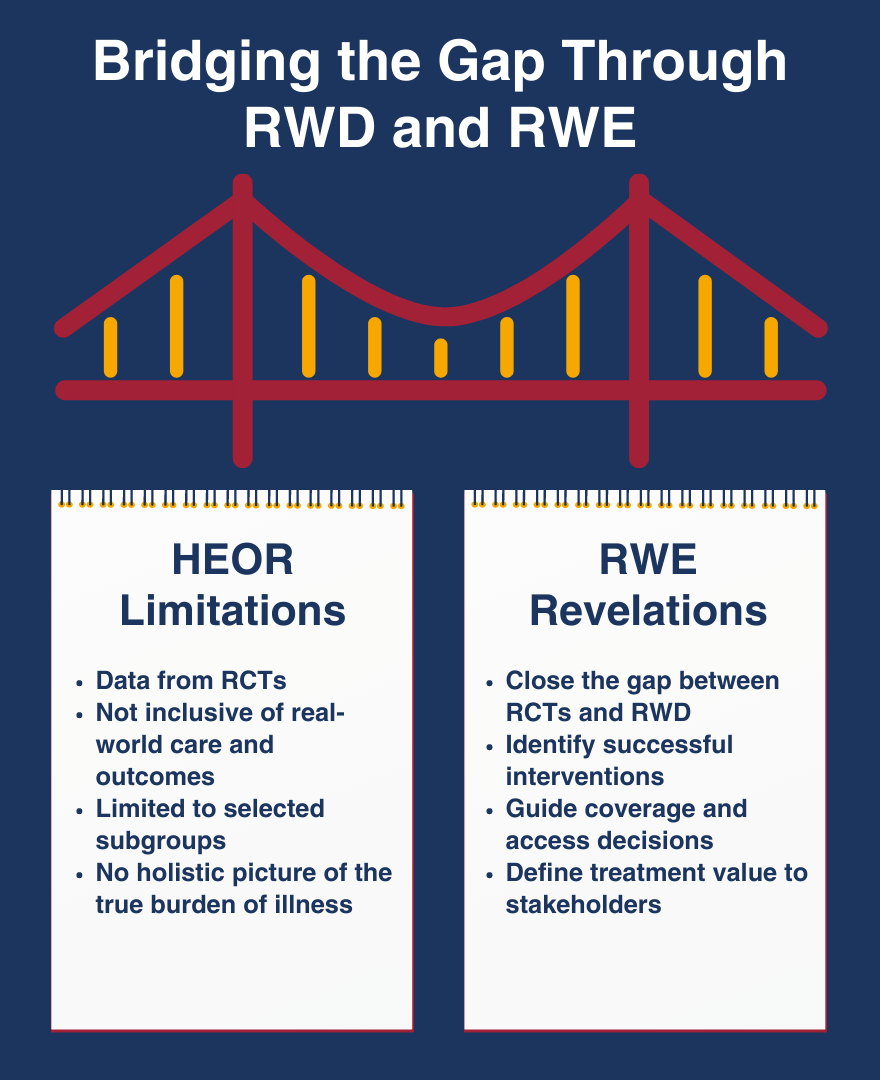Real-world data (RWD) and real-world evidence (RWE) are transforming the future of healthcare, including how Health Economics & Outcomes Research (HEOR) reveals the true burden of disease.
Clinical trial data and payer-limited datasets are not enough to fully understand the disease burden of health conditions on particular patient populations, much less inform decisions for future interventions. RWD and RWE reveal what really occurs with a treatment on a routine basis across diverse groups, uncovering a more holistic picture of the true burden of disease. RWD and RWE can also potentially reveal new findings about the burden of illness not easily found through traditional data.
In this blog, learn what it means to understand the burden of illness within HEOR, limitations of traditional HEOR methods, and how RWD and RWE bridge the gap between research and practice.
Understanding the Burden of Illness
Pharmaceutical companies need to develop evidence that supports communications with payers and policymakers on the economic burden of disease.
Burden of illness, also known as burden of disease, measures the impact of a health condition on various groups, from healthcare providers and managed care organizations to employers, payers, and patients. For each group, mortality, morbidity, and financial implications, among other factors, can be measured.
Within HEOR, measuring the economic impact of a disease is the first step to informing healthcare interventions, treatments, policies, and priority settings that can reduce its prevalence and impact. Understanding the burden of illness within HEOR often requires assessing the cost, which measures medical expenditures, non-medical costs, and productivity losses from a disease.
Medical expenditures include diagnostic testing, office visits, drugs, and medical supplies, whereas non-medical costs include travel and childcare that ensue from a person getting treatment. Productivity losses, which are less quantifiable, focus on the time lost for activities like work and leisure.
Limitations of Traditional HEOR Methods In Estimating the Burden of Illness
Data from randomized controlled trials (RCTs) provide the basis for traditional HEOR methods, but the rise of RWD has challenged its comprehensiveness and effectiveness to estimate the true burden of illness. Traditional HEOR data is gathered from RCTs where study design controls do not always represent real-world scenarios or provide insight into long-term effects and economic outcomes.
RWD continuously collects and analyzes the everyday usage, benefits, risks, and outcomes of treatment.
Traditional HEOR methods have focused on the “typical patient” or “one-size-fits-all” solutions, often leveraging data averages or medians to inform decisions. This method fails to identify targeted patient populations and the discrepancies across patient subgroups to assess the true burden of a health condition accurately.
Bridging the Gap
RWD and RWE are having a profound impact on the future of healthcare, rapidly advancing methods for uncovering the true burden of disease.
RWE delivers a holistic picture of the true burden of illness for particular patient populations that might not have been considered with limited data sets.

Getting Started
Gaining a complete, real-world picture of the burden of illness for a health condition is powerful. RWD and RWE are advancing the way pharmaceutical companies, healthcare providers, payers, and patients make decisions about healthcare—proactively, in real-time, and for future interventions. RWD and RWE are transformational and are here to stay.
RWD Insights, powered by STATinMED Research, is a real-time all-payer medical and pharmacy claims data source that encompasses more than 80% of the US healthcare system.
STATinMED delivers keen insights to inform and shape initiatives that may reduce the burden of illness for patients.
To learn the true burden of disease for a particular health condition by leveraging RWD Insights and RWE services by STATinMED, contact us.
As real-world evidence authorities, STATinMED Research discovers data, develops insights and delivers optimal solutions to help life science companies realize maximum value.
We understand real-world evidence and solve problems with confidence. Contact STATinMED’s Strategic Advisory Services to learn more!




